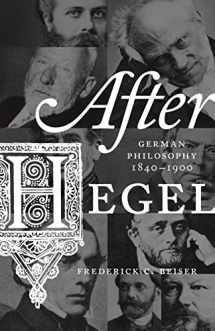
After Hegel: German Philosophy, 1840–1900
ISBN-13:
9780691173719
ISBN-10:
0691173710
Edition:
Reprint
Author:
Frederick C. Beiser
Publication date:
2016
Publisher:
Princeton University Press
Format:
Paperback
248 pages
Category:
Germany
,
European History
,
World History
,
Modern
,
Philosophy
,
Movements
FREE US shipping
on ALL non-marketplace orders
Rent
35 days
Due Jun 22, 2024
35 days
from $22.50
USD
Marketplace
from $30.63
USD
Marketplace offers
Seller
Condition
Note
Seller
Condition
Used - Good
Book details
ISBN-13:
9780691173719
ISBN-10:
0691173710
Edition:
Reprint
Author:
Frederick C. Beiser
Publication date:
2016
Publisher:
Princeton University Press
Format:
Paperback
248 pages
Category:
Germany
,
European History
,
World History
,
Modern
,
Philosophy
,
Movements
Summary
After Hegel: German Philosophy, 1840–1900 (ISBN-13: 9780691173719 and ISBN-10: 0691173710), written by authors
Frederick C. Beiser, was published by Princeton University Press in 2016.
With an overall rating of 3.6 stars, it's a notable title among other
Germany
(European History, World History, Modern, Philosophy, Movements) books. You can easily purchase or rent After Hegel: German Philosophy, 1840–1900 (Paperback) from BooksRun,
along with many other new and used
Germany
books
and textbooks.
And, if you're looking to sell your copy, our current buyback offer is $2.17.
Description
Histories of German philosophy in the nineteenth century typically focus on its first half―when Hegel, idealism, and Romanticism dominated. By contrast, the remainder of the century, after Hegel's death, has been relatively neglected because it has been seen as a period of stagnation and decline. But Frederick Beiser argues that the second half of the century was in fact one of the most revolutionary periods in modern philosophy because the nature of philosophy itself was up for grabs and the very absence of certainty led to creativity and the start of a new era. In this innovative concise history of German philosophy from 1840 to 1900, Beiser focuses not on themes or individual thinkers but rather on the period’s five great debates: the identity crisis of philosophy, the materialism controversy, the methods and limits of history, the pessimism controversy, and the Ignorabimusstreit. Schopenhauer and Wilhelm Dilthey play important roles in these controversies but so do many neglected figures, including Ludwig Büchner, Eugen Dühring, Eduard von Hartmann, Julius Fraunstaedt, Hermann Lotze, Adolf Trendelenburg, and two women, Agnes Taubert and Olga Pluemacher, who have been completely forgotten in histories of philosophy. The result is a wide-ranging, original, and surprising new account of German philosophy in the critical period between Hegel and the twentieth century.


We would LOVE it if you could help us and other readers by reviewing the book
Book review

Congratulations! We have received your book review.
{user}
{createdAt}
by {truncated_author}




